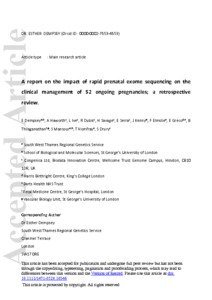Dempsey, E;
Haworth, A;
Ive, L;
Dubis, R;
Savage, H;
Serra, E;
Kenny, J;
Elmslie, F;
Greco, E;
Thilaganathan, B;
et al.
Dempsey, E; Haworth, A; Ive, L; Dubis, R; Savage, H; Serra, E; Kenny, J; Elmslie, F; Greco, E; Thilaganathan, B; Mansour, S; Homfray, T; Drury, S
(2021)
A report on the impact of rapid prenatal exome sequencing on the clinical management of 52 ongoing pregnancies: a retrospective review.
BJOG, 128 (6).
pp. 1012-1019.
ISSN 1471-0528
https://doi.org/10.1111/1471-0528.16546
SGUL Authors: Elmslie, Frances
![[img]](https://openaccess.sgul.ac.uk/112446/1.hassmallThumbnailVersion/1471-0528.16546.pdf)  Preview |
|
PDF
Accepted Version
Available under License ["licenses_description_publisher" not defined].
Download (8MB)
| Preview
|
Abstract
Objective
Studies have shown that prenatal exome sequencing (PES) improves diagnostic yield in cases of fetal structural malformation. We have retrospectively analysed PES cases from two of the largest fetal medicine centres in the UK to determine the impact of results on management of a pregnancy.
Design
A retrospective review of clinical case notes.
Setting
Two tertiary fetal medicine centres.
Population
Pregnancies with fetal structural abnormalities referred to clinical genetics via a multidisciplinary team.
Methods
We retrospectively reviewed the notes of all patients who had undergone PES. DNA samples were obtained via chorionic villus sampling or amniocentesis. Variants were filtered using patient‐specific panels and interpreted using American College of Medical Genetics guidelines.
Results
A molecular diagnosis was made in 42% (18/43) ongoing pregnancies; of this group, there was a significant management implication in 44% (8/18). A positive result contributed to the decision to terminate a pregnancy in 16% (7/43) of cases. A negative result had a significant impact on management in two cases by affirming the decision to continue pregnancy.
Conclusions
We demonstrate that the results of PES can inform pregnancy management. Challenges include variant interpretation with limited phenotype information. These results emphasise the importance of the MDT and collecting phenotype and variant data. As this testing is soon to be widely available, we should look to move beyond diagnostic yield as a measure of the value of PES.
| Item Type: |
Article
|
| Additional Information: |
This is the peer reviewed version of the following article: Dempsey, E, Haworth, A, Ive, L, Dubis, R, Savage, H, Serra, E, Kenny, J, Elmslie, F, Greco, E, Thilaganathan, B, Mansour, S, Homfray, T, Drury, S. A report on the impact of rapid prenatal exome sequencing on the clinical management of 52 ongoing pregnancies: a retrospective review. BJOG: Int J Obstet Gy. 2021; 128: 1012– 1019, which has been published in final form at https://doi.org/10.1111/1471-0528.16546. This article may be used for non-commercial purposes in accordance with Wiley Terms and Conditions for Use of Self-Archived Versions. |
| Keywords: |
Exome Sequencing, Prenatal genetic testing, 11 Medical and Health Sciences, Obstetrics & Reproductive Medicine |
| Journal or Publication Title: |
BJOG |
| ISSN: |
1471-0528 |
| Language: |
eng |
| Publisher License: |
Publisher's own licence |
| Projects: |
|
| PubMed ID: |
32981126 |
 |
Go to PubMed abstract |
| URI: |
https://openaccess.sgul.ac.uk/id/eprint/112446 |
| Publisher's version: |
https://doi.org/10.1111/1471-0528.16546 |
Statistics
Item downloaded times since 01 Oct 2020.
Actions (login required)
 |
Edit Item |



